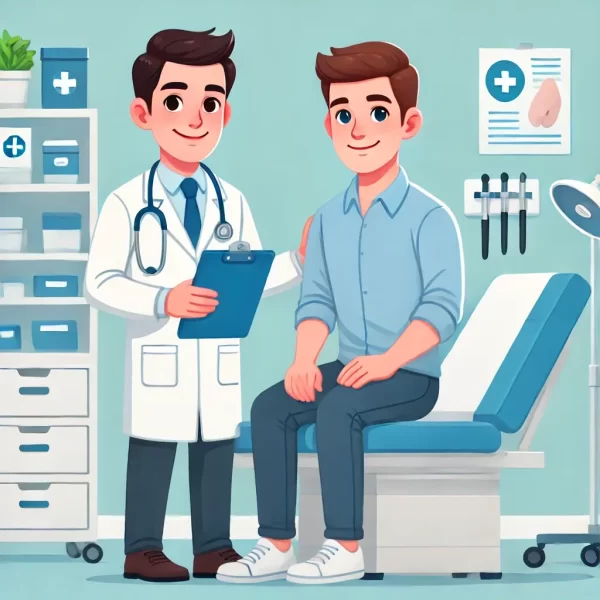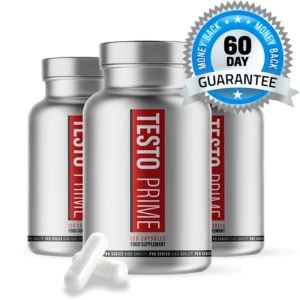You might think testosterone only matters in the gym or the bedroom—but the truth is, it affects almost every aspect of a man’s physical and mental health. From energy levels and muscle strength to mood, motivation, and sexual function, testosterone is at the core of what helps you feel sharp, driven, and alive.
Yet many men live with low testosterone (or “Low T”) without even realizing it.
Why? Because the symptoms often start subtly—feeling more tired than usual, losing interest in sex, or struggling to stay focused. These signs are easy to blame on aging, stress, or just a “bad week.” But left unaddressed, low T can lead to long-term consequences for your performance, confidence, and overall well-being.
In this article, we’ll uncover 7 signs of low testosterone that most men overlook—and what you can start doing today to restore your hormonal balance naturally.
1. Constant Fatigue, Even After Rest
Everyone feels tired sometimes—but if you’re constantly low on energy, even after getting 7–8 hours of sleep, it could be more than just a busy schedule. Persistent fatigue is one of the earliest and most common signs of low testosterone in men.
✅ Why It Happens
Testosterone plays a key role in regulating your cellular energy production. When levels drop, your body becomes less efficient at converting nutrients into usable energy, leaving you feeling sluggish, unmotivated, and mentally foggy.
What It Feels Like
- You wake up feeling unrested, even after a full night’s sleep
- You hit an energy wall by mid-afternoon, almost every day
- You’ve lost motivation to work out, socialize, or pursue hobbies
⚠️ Don’t Confuse It With Burnout
Fatigue from low T is deeper and more consistent than typical burnout. It doesn’t always improve with a few days of rest or vacation. If you feel “worn out” most of the time—even when life isn’t chaotic—testosterone could be a key factor.

2. Low Libido and Reduced Morning Erections
A drop in sex drive is one of the clearest indicators of low testosterone, yet it’s often the one most men try to ignore or rationalize. Whether it’s stress, a busy schedule, or “just getting older,” declining libido is often written off—when in fact, it may signal something deeper.
✅ Why It Happens
Testosterone is the hormone that fuels sexual desire and arousal. When levels fall, so does interest in sex. In addition, testosterone plays a critical role in maintaining nocturnal and morning erections, which are natural signs of healthy hormonal function.
What to Watch For
- Less frequent sexual thoughts or fantasies
- Lack of interest in initiating intimacy
- Fewer or weaker morning erections than usual
- Difficulty getting or staying aroused, even in stimulating situations
Many men assume that libido changes are “normal” with age—but a sudden or sustained drop in desire is often hormonal, not psychological.
Internal Tip:For a deeper look into what drives male desire (and how to get it back), check out our full guide on low libido in men.
3. Mood Swings and Irritability
If you’ve been feeling more emotionally reactive, impatient, or down for no clear reason, it may not be “just stress” or personality changes—it could be low testosterone silently affecting your brain chemistry.
✅ Why It Happens
Testosterone has a strong influence on neurotransmitters like dopamine and serotonin, which regulate mood, motivation, and emotional stability. When testosterone drops, it disrupts this balance—making you more prone to irritability, anxiety, or even depressive episodes.
Common Emotional Signs
- You get irritated by small things more easily
- You feel unusually anxious or overwhelmed
- Your confidence seems to fluctuate for no reason
- You’ve lost your sense of emotional resilience
Low T doesn’t always lead to full-blown depression—but it often causes low-grade emotional instability that wears you down over time.
💡 Reminder:
If these mood changes are happening alongside other physical signs (fatigue, low libido, brain fog), it’s worth checking your hormone levels—not just blaming external stress.
4. Increased Belly Fat and Decreased Muscle Mass
If you’re noticing your midsection getting softer, your arms looking smaller, or your clothes fitting differently despite no major change in diet or exercise, low testosterone might be to blame.

✅ Why It Happens
Testosterone helps regulate body composition by promoting muscle protein synthesis and supporting fat metabolism. When levels decline:
- Muscle maintenance becomes harder
- Fat (especially belly fat) accumulates faster
- Your metabolism slows down overall
🔍 What to Look For
- Loss of muscle definition, even if you’re working out
- Softness or “puffiness” around the lower belly or chest
- Weight gain despite eating the same or exercising more
⚠️ The Vicious Cycle
Increased belly fat doesn’t just result from low T—it can further suppress testosterone production, especially visceral fat around your organs. This creates a feedback loop that gets harder to break the longer it goes unchecked.
If you’ve been gaining fat and losing muscle with no clear cause, it’s worth investigating your testosterone levels—especially if you’re also feeling more tired, moody, or unmotivated.
5. Difficulty Concentrating or “Brain Fog”
Do you feel like your mental sharpness just isn’t what it used to be? You can’t focus like before, forget little things more often, or feel like your thoughts are moving slower? This isn’t just aging—it could be a sign of low testosterone.
✅ Why It Happens
Testosterone influences cognitive function by supporting the activity of neurotransmitters responsible for memory, concentration, and mental clarity. Low levels can impair neural efficiency, leading to:
- Slower thinking
- Trouble concentrating
- Memory lapses
- Difficulty with multitasking
What Brain Fog Feels Like
- Struggling to focus during conversations or reading
- Forgetting simple tasks or names more frequently
- Feeling mentally “foggy” or detached, even when well-rested
- Losing your mental edge at work or in decision-making
💡 Don’t Brush It Off
Brain fog related to low T often appears gradually, making it easy to ignore. But when paired with fatigue, low motivation, and mood changes—it’s a key red flag.
If your mind feels like it’s running at 70% when it used to be razor-sharp, don’t assume it’s “just getting older.” Your hormones may be part of the equation.
6. Low Semen Volume and Fertility Issues
Testosterone doesn’t just influence your sex drive—it also plays a central role in sperm production and semen volume. When testosterone levels drop, the entire reproductive system can be affected, often without men realizing it until fertility becomes a concern.
✅ Why It Happens
Testosterone is essential for the function of the testes, where sperm and seminal fluid are produced. Low levels can impair:
- The quantity and quality of sperm
- The volume of ejaculate
- The overall health of reproductive tissues
What You Might Notice
- Less semen released during ejaculation
- Semen appears more watery or thinner than usual
- Difficulty conceiving despite regular unprotected intercourse
- Testes feel smaller or less firm
⚠️ Important Distinction
Low semen volume doesn’t always equal infertility—but it’s often a warning sign that testosterone (or other hormones like FSH/LH) may be out of balance. It’s also one of the most overlooked symptoms of low T, especially in men not actively trying to conceive.
If you’ve noticed a change in semen volume or are concerned about fertility, a testosterone test—along with a semen analysis—can offer clarity.

7. Decreased Motivation and Confidence
Do you feel like your drive has faded—not just in the bedroom, but in life in general? You’re less competitive, less ambitious, and less enthusiastic about challenges you used to enjoy? This could be more than just burnout—it might be low testosterone affecting your core motivation.
✅ Why It Happens
Testosterone is closely linked to dopamine, the brain chemical responsible for drive, confidence, and pleasure. When testosterone drops, so does dopamine activity, leading to:
- Lower mental and physical motivation
- Decreased assertiveness
- A subtle decline in self-belief and confidence
- Loss of interest in goals, projects, or even social interaction
Signs You Might Overlook
- Skipping workouts you used to enjoy
- Feeling “flat” emotionally, even after achieving something
- Procrastinating more, pushing less
- Avoiding challenges or responsibilities you once thrived on
Low T doesn’t just affect how you look or perform—it can reshape how you feel about yourself, which is why many men don’t feel like “themselves” anymore when levels drop.
If several of these signs feel familiar, you’re not alone—and you’re not stuck. The good news is that low testosterone is often reversible, especially when caught early. Before considering hormone therapy, try these natural strategies to restore balance and rebuild your energy, drive, and confidence.
What to Do If You Recognize These Signs
Realizing you might be dealing with low testosterone can feel overwhelming—but it doesn’t have to be. In many cases, the most effective first steps aren’t found in a prescription bottle, but in your daily habits.
Here’s how you can naturally start restoring hormonal balance:
✅ Prioritize Sleep (7–8 hours nightly)
Testosterone production peaks during deep sleep, especially in the early morning hours. Poor sleep = poor testosterone.
Aim for a consistent sleep schedule, dark room, and reduced screen time before bed.
✅ Strength Train 3–4 Times Per Week
Resistance training—particularly compound movements like squats and deadlifts—has been shown to naturally boost testosterone.
Keep sessions intense but not overly long. Rest and recovery matter too.
✅ Eat Testosterone-Supporting Foods
Include foods rich in zinc, vitamin D, magnesium, and healthy fats (like eggs, nuts, fatty fish, and avocado).
Avoid processed carbs, excess sugar, and seed oils, which can disrupt hormone balance.
✅ Reduce Stress and Cortisol
Practice deep breathing, daily walks, or mindfulness to counteract the testosterone-lowering effects of chronic stress.
Even 10 minutes a day of focused breathing can reset your nervous system.
✅ Consider Natural Testosterone Boosters
If lifestyle changes alone aren’t enough, certain supplements can help bridge the gap. Look for formulas containing ingredients like fenugreek, ashwagandha, zinc, and vitamin D.
For trusted options, check out our guide to the best testosterone boosters in 2025.
Start small. Even 2–3 of these habits, practiced consistently, can begin shifting your testosterone in the right direction—often within just a few weeks.
When to Get Tested for Low Testosterone
Lifestyle changes are a great starting point—but if you’ve been experiencing three or more of the symptoms we’ve covered, and they persist for over 8–12 weeks, it’s time to consider testing.
When to Test
- You’ve had ongoing fatigue, low libido, or mood changes for more than 2–3 months
- Natural changes (diet, sleep, exercise) haven’t made a noticeable difference
- You’re struggling with fertility or changes in testicular size
- You’re in your 30s, 40s, or beyond and feel “off” without a clear reason
🔍 What to Expect
- Morning blood test between 7–10 AM gives the most accurate testosterone reading
- Ask for both total testosterone and free testosterone
- Consider adding tests for SHBG, LH, and FSH for a more complete hormonal picture
Many men delay testing out of fear or embarrassment—but understanding your numbers gives you power. It helps you make informed decisions about what to do next—whether that’s continuing with lifestyle changes, supplements, or talking to a specialist.





